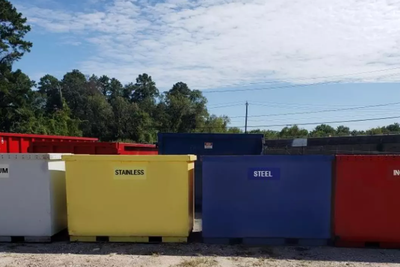reduce, reuse, recycle
Houston energy company diverts over 125M pounds of scrap metals from landfills

In partnership with Venture Metals +, Baker Hughes has saved over 125 million pounds of scrap metals from more than 50 of the company's locations around the world. Photo via bakerhughes.com
For three years, Baker Hughes has been working with a full-scale scrap processor partner to divert scrap metal waste from landfills as a part of the company's net-zero commitment by 2050.
In partnership with Venture Metals +, Baker Hughes has saved over 125 million pounds of scrap metals from more than 50 of the company's locations around the world.
Venture Metals + collects, recycles, and manages the full recycling process of scrap materials, providing recycling, reclamation, and investment recovery as a service to industrial, manufacturing, and service facilities.
“The relationship that has been formed between Baker Hughes and Venture Metals is the definition of a true partnership. Over the many years we have collaborated on significant projects and there has been a foundation of trust, transparency and investment on both sides,” Venture Metals’ Vice-Chairman of the Board Mark Chazanow says in a news release. “Together, we have been able to do our part to improve the environment by circular and sustainable recycling while also capturing substantial revenue gain. We look forward to growing the partnership and seeing a bright future ahead together.”
According to the release, Baker Hughes plans to grow the partnership to introduce similar programs at five key locations around the world. Venture Metals+ also set up Baker Hughes with customized containers to help separate titanium, stainless steel, Inconel, and other recyclable metals.
“Reducing our environmental footprint is a critical focus area for our sustainability strategy as we continue to reduce waste, minimize the resources we use and promote circularity,” Allyson Anderson Book, chief sustainability officer at Baker Hughes, adds. “Through partners like Venture Metals +, we are minimizing waste and reusing scrap materials as much as possible for more sustainable operations.”